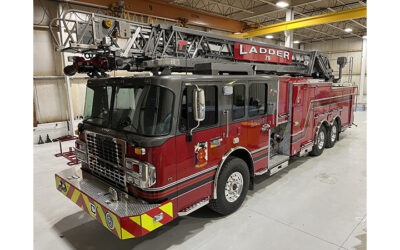By Bill Adams
Sandbagging is a term often heard when playing cards and sports. It’s a term that isn’t necessarily deceitful, although it can be. In the world of fire apparatus purchasing, sandbagging happens all the time, although it’s not always advertised, promoted, or acknowledged as such. Whether sandbagging is ethical, legal, or morally correct is a matter of personal opinion. It probably depends if one is the sandbagger or the sandbagee. It’s a subtle interaction between buyer and seller. Its importance can range from inconsequential to scandalous. Combining and paraphrasing multiple definitions (sans any reference to sports or playing cards) sandbagging is: intentionally misleading another to achieve a certain goal; feigning ignorance of a topic to gain an unfair advantage; purposefully distorting facts for financial gain; and misrepresenting by design one’s intentions for nefarious reasons. The four definitions appear denigrating to vendors selling fire apparatus, however they can also be applicable to the purchaser.
Sandbagging normally does not occur when an apparatus purchasing committee (APC) has a longstanding and good working relationship with a favored apparatus vendor. The APC knows the vendor, the vendor knows the committee, and everything is copasetic during the purchasing process. The phenomena may occur when relatively new members of a purchasing committee attempt to flex their muscles by trying to demonstrate how knowledgeable they are. Newbies may pose trick or “gotcha” questions to the favored vendor. That’s sandbagging in a nonsalacious way. The vendor might just accept it and let it go. Or, probably to the delight of older committee members, he could verbally slap down the newbie. That could be hazardous in the future because the newbie may have a long memory.
Sandbagging is commonplace when a vendor hasn’t had previous interaction with an APC. Other than hearsay, they might have no direct knowledge of each other. Initial meetings are when each party gets to evaluate each other. Sandbagging can sometimes be an integral part of the process. Neither player wants to lay all their cards on the table. In this scenario, there is an assumption that both buyer and seller are aboveboard and honest—albeit not necessarily 100 percent so. A vendor wants to demonstrate his capabilities yet does not want to portray himself as a know-it-all. Likewise, the APC is attempting to appraise the vendor’s qualifications as well as making the committee look competent enough to spec out a new rig. If and when both parties come to a mutual trust, the purchasing process can continue unabated.
On the negative side, an APC might have to meet with a nonpreferred vendor because of purchasing protocol. Because an APC may want another’s rig, it might sandbag the vendor to disparage him and hopefully drive him away from the bid table. Most experienced vendors can tell when they are being used or abused. Some may retaliate by asking committee members questions they also are incapable of answering—they’ve been sandbagged. A vendor knowing there’s no chance of making a sale may try to get a few jabs in before going home.
Vendors can sandbag a committee by not being completely forthright when answering questions. As an example, when questioned about the availability of 24/7 service, a vendor can say it is available but does not say the service truck is coming from two hundred miles away! Another example is telling an APC he will write them an “open” purchasing specification and in turn write one that is absolutely proprietary to his own product. Both examples are borderline dishonest to completely deceitful. There’s a song about a card player that says, “You got to know when to fold them and know when to hold them.” Is it sandbagging or salesmanship?
BILL ADAMS is a member of the Fire Apparatus & Emergency Equipment Editorial Advisory Board, a former fire apparatus salesman, and a past chief of the East Rochester (NY) Fire Department. He has 50 years of experience in the volunteer fire service.






